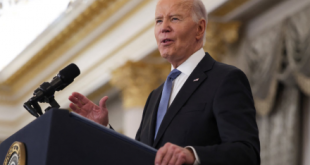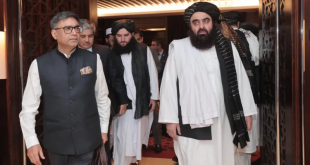By Wang Yu, Chinese Ambassador to Afghanistan
Chinese President Xi Jinping recently attended a series of high-level meetings marking the 75th anniversary of the founding of the United Nations. While addressing those meetings, he gave a comprehensive and systematic answer to the major questions before mankind. What kind of world will mankind face in the post-pandemic era? What role will China play in and for the world? What kind of international order do we need? He made it very clear that China will firmly pursue multilateralism, uphold the authority of the UN, stick to the path of peaceful development and win-win cooperation and persevere in building a community of a shared future for mankind. He also sketched the Chinese proposal for the evolving international pattern, including the following elements:
First, countries in the world should strengthen cooperation to fight against the COVID-19 pandemic. In the fierce ‘battle’ since the beginning of this year, people of all countries have stood by and supported each other. The great courage, determination and care of mankind in the face of major disasters illuminate even the darkest moments. In the pandemic, the people and their lives being given supremacy must be the guiding philosophy in our response. Then we need to mobilize all resources towards targeted science-based prevention and control measures. We must strengthen solidarity and stand together as sailors in the same boat, armed with the spirit of science. We must give full play to the critical leadership of the World Health Organization, promote joint prevention and control at the international and global levels, adopt resolute actions to block the pandemic and oppose politicization and stigmatization of COVID-19 and its victims. We must develop a full set of regular response measures, promote an orderly resumption of business in all settings, create jobs and boost economic growth so as to restore economic and social order and vitality. Developing countries should be taken care of with timely strong measures in debt relief and aid.
Second, the role of the UN should be further improved in the new era. The world today is going through major changes unseen in a century. In this new era of connectivity, countries are inextricably linked in their interests and destinies. Global threats and challenges require a strong global response, with the UN playing a more crucial role. It must uphold justice, follow the principle of consultation and cooperation for shared benefits, take earnest measures to enhance the representation and voice of developing countries and reflect the interests and wishes of the majority of countries in a more balanced manner. Countries must uphold the rule of law, unswervingly safeguard the purposes and principles of the UN Charter and coordinate the relations and interests of all countries within institutional setups and rules. They must also promote cooperation, align national interests with the common interests of all and build a harmonious and cooperative international family. They should focus on taking actions and solving problem, promote security, development and human rights in a balanced manner and give prominence to development in the global agenda.
Third, global challenges should be actively addressed. The COVID-19 pandemic has been a further revelation that mankind indeed lives in an interconnected global village of common weal and woe. Countries should therefore foster a sense of community with a shared future, think beyond small coteries and zero-sum games and adopt the concept of a big family and win-win. They should uphold openness and inclusion, pursue unswervingly an open world economy, safeguard the multilateral trading system with the World Trade Organization as its cornerstone, take a clear stand against unilateralism and protectionism, and maintain the stability and unimpeded connection of the global industrial and supply chains. A new concept of innovative, coordinated, green, open and shared development is essential to create synergy for sustainable development. Countries should uphold multilateralism, maintain the international system with the UN at its core and adapt the global governance system to the changing world political economy, which is a realistic need in light of the global challenges and represents the historical trend of peaceful development and win-win cooperation.
Fourth, countries should work together to build a harmonious and beautiful homeland for all beings. At present, global species become extinct at accelerated rate. The loss of biodiversity and the ecosystem degradation pose a major risk to human survival and development. We must make concerted efforts and act quickly in both protection and development. With ecological civilization being a desirable objective, all people should be motivated to build a beautiful world, explore the path to harmonious coexistence between man and nature and promote the coordination and unity between economic development and ecological protection. Countries should forge synergy in and enhance the level of global environmental governance through multilateralism. Green development will be key to cultivate high-quality post-pandemic economic recovery and vitality. ‘Our solutions are in nature.’ It is essential to find development opportunities in the course of protecting nature and achieve success in both eco-environmental protection and high-quality economic development. With a higher sense of responsibility, countries must now enhance their capacity to address environmental challenges and honor their commitments with concrete actions, thus effectively reversing the loss of biodiversity and jointly safeguarding planet Earth.
Fifth, we must also promote the global women’s causes. Women are founders of human civilization and promoters of social progress. In the past 25 years since the World Conference on Women in Beijing, the social status of women has improved significantly, with their role of ‘holding up half the sky’ increasingly prominent. Countries must now unite to help women out of the pandemic and prioritize the protection of women’s and girls’ rights and interests in public health and return-to-work programmes. In particular, actions should be taken to broaden women’s access to employment and crack down on violations of their rights and interests. To make gender equality a reality, post-pandemic recovery offers a new opportunity to increase women’s political participation, improve their level of participation in the management of state, economic, cultural and social affairs, eliminate prejudice, discrimination and violence against women, and let gender equality truly become the behavioral norm and values of the whole society. All countries should empower and enable women to lead, protect women’s rights and interests in the course of development, improve women’s livelihood through development, promote women’s cause along with socio-economic development and support and help women to excel in life. Global cooperation in women’s causes should be strengthened by supporting the UN in giving priority to work on women’s affairs, increasing women’s representation in the UN system, enriching the gender equality toolbox and improving the global road map for women’s development.
President Xi also announced a series of major new proposals and initiatives. With regard to pandemic response, China will provide an additional USD 50 million to the UN Global Humanitarian Response Plan for COVID-19. In support of the UN, China will provide USD 50 million to the China-FAO South-South Cooperation Trust Fund (Phase III), extend the China-UN Peace and Development Fund for another five year after its expiry in 2025, and set up the UN global knowledge and innovation centre for geographic information and the international research centre on big data for sustainable development to provide new impetus for the implementation of the 2030 Agenda for Sustainable Development. To promote global women’s development, China will provide a further USD 10 million to UN Women over the next five years, continue supporting the China-UNESCO Prize for Girls’ and Women’s Education, and called for another global women’s summit in 2025. In terms of environmental governance, China endeavours to peak in carbon dioxide emissions by 2030 and achieve carbon neutrality by 2060. These are initiatives taken by China to promote international peace and development and also its solid actions to firmly support the existing international order and safeguard the development rights and interests of developing countries.
President Ghani also attended the general debate of the 75th Session of the UN General Assembly. He expressed views on maintaining international order and promoting economic and social development in Afghanistan, reaffirmed the role of the UN in the process towards peace in Afghanistan, called for a UN with authority, capacity, capital and commitment and emphasized the need to implement and respect the purposes and principles of the UN Charter. He also stressed the necessity for the UN to facilitate pandemic response and return-to-work in Afghanistan, the importance of achieving lasting peace and stability, the urgency of maintaining the safety and health of Afghan women and children and the inevitability of addressing climate change through international cooperation.
Many of the Afghan President’s views coincide with those of Xi. China and Afghanistan are both developing countries and share weal and woe in the global governance system. Both have experienced aggression, civil war and poverty. Our peoples have both suffered enormously in the struggle against colonialism, imperialism and hegemony. We therefore both stress the need to safeguard a healthy international order and practice multilateralism. In the lead up to World War II, some countries broke away from the international system and refused to communicate with other countries in the world. Today, all mankind is fighting the COVID-19 pandemic, eco-environmental crises, injustice and inequality. The people of Afghanistan continue to fight and die on the frontlines of the war against terror. With these in mind, it is all the more imperative for all countries to focus on the future of humanity, abandon the Cold War mentality and ideological biases and join hands against all crises.
Five years ago, at the general debate of the 70th Session of the UN General Assembly, President Xi proposed a five-pronged approach to building a community of shared future for mankind. Over the past five years, the community between China and Afghanistan has been further developed through the implementation of the Belt and Road Initiative (BRI), the development of regional connectivity and the joint fight against COVID-19. Mutual trust between our two peoples have been enhanced and people-to-people exchanges have been deepened, bearing more fruits. The opening ceremony of intra-Afghan negotiations was successfully held recently. Chinese Foreign Minister and State Councilor Wang Yi reiterated the need to follow the ‘Afghan-led, Afghan-owned’ principle, put forward his suggestions and expectations for a political solution to the Afghan issue and expressed best wishes for peace in Afghanistan.
The world order is through profound and complex changes, but peace and development remain the theme of the times and a constant topic in China- Afghanistan cooperation. China will further strengthen communication and cooperation with Afghanistan in peaceful development. Guided by the Xi Jinping thought on socialism with Chinese characteristics for a new era and his thought on diplomacy, China will remain a supporter, mediator and facilitator of the Afghan peace and reconciliation process. Together with all parties concerned, China will continue supporting the fundamental direction of a political settlement, the basic ‘Afghan-led, Afghan-owned’ principle and an extensive and inclusive framework goal. China will strengthen bilateral relations with Afghanistan within the global governance system, support Afghanistan to participate more in the BRI and share the dividends of Chinese economic development. China will do its utmost to help Afghanistan combat the COVID-19 pandemic, push for an orderly return-to-work and actively participate in the economic and livelihood development here in the post-pandemic era, thus contributing its strength to the well-being of the Afghan people.
 Afghanistan Times
Afghanistan Times




